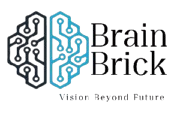Case Study: BrainBrick Chatbot

Transforming Healthcare with AI: The Mission of a Specialized Chatbot
The objective of this case study is to demonstrate the effectiveness of a specialized healthcare information chatbot in providing accurate, timely, and user-friendly healthcare-related information to users. The chatbot is designed to assist users with general health inquiries, symptom education, preventive measures, medical terminology, mental health awareness, and healthy lifestyle recommendations.
In the healthcare industry, patients often face challenges when seeking reliable and easy-to-understand health information. A healthcare information assistant chatbot has been developed to bridge this gap by offering users an accessible platform for obtaining health-related guidance. This case study explores how the chatbot provides accurate health information, educates users on various medical topics, and supports users in making informed decisions regarding their health.
65%
3D Modeling
65%
3D Modeling
65%
3D Modeling
Overcoming the Healthcare Information Maze: How an AI Chatbot Simplifies Patient Queries
Patients often encounter difficulties in finding accurate and understandable healthcare information online. Inaccurate or overwhelming information can lead to confusion, misinformation, and anxiety. This case study aims to explore how a healthcare chatbot can address these challenges by offering a reliable, user-friendly platform to answer health-related questions.
Step-by-Step Journey: Developing a Healthcare Chatbot
Step 1: Chatbot Development
- Built using advanced NLP, capable of addressing health-related queries.
- Knowledge base includes topics like general health, symptoms, first aid, preventive care, mental health, and healthy lifestyles.
Step 2: User Interaction
- Users initiate conversations via web/mobile platforms.
- The chatbot assists with queries on symptoms, treatment, or preventive measures.
Step 3: Information Retrieval
- Processes user queries using NLP and retrieves relevant, evidence-based advice.
- Recommends consulting healthcare professionals when necessary.
Step 4: User Education
- Educates users on health topics, offering overviews of illnesses, symptoms, and preventive care.
Step 5: Mental Health Awareness
- Provides resources on mental health, signs of depression or anxiety, and stress management tips.
Step 6: Continuous Learning
- Learns from interactions and user feedback to enhance accuracy and user experience.



